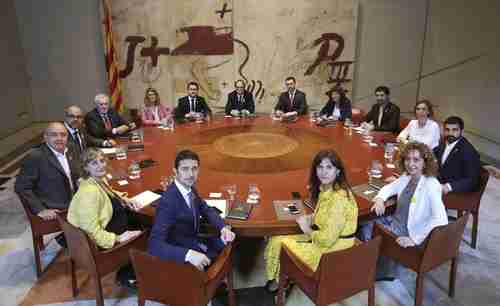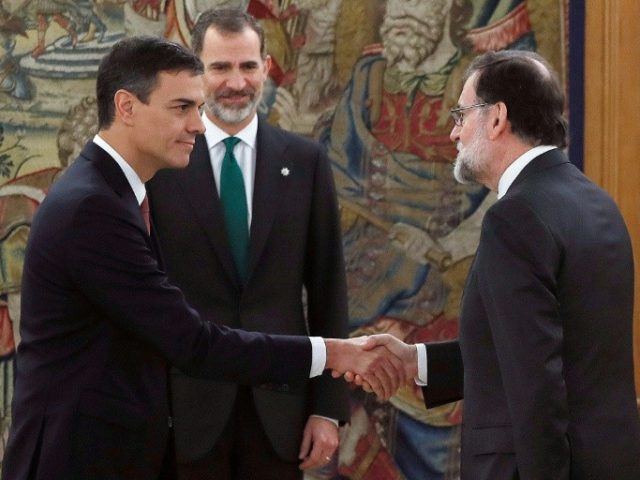This morning’s key headlines from GenerationalDynamics.com
- Spain’s new government faces an immediate Catalonia problem
- Italy’s markets stabilize as new ‘populist’ government takes office
Spain’s new government faces an immediate Catalonia problem

Catalonia’s new government after swearing-in ceremony in Barcelona. (AP)
There were actually two new Spanish governments sworn in this weekend.
One was Spain’s national government in Madrid, where the new Socialist prime minister Pedro Sánchez was sworn in, after a vote of no confidence defeated the conservative government led by Mariano Rajoy.
The other was the Catalonia government in Barcelona. Madrid imposed direct rule on Catalonia after declaring illegal a referendum on Catalan independence on October 1. Direct rule ended and Catalonia’s new government was also sworn in on Saturday.
Catalonia’s new president Quim Torra called for talks with Sánchez, to resolve the question of independence for Catalonia. Just minutes after Sánchez was sworn in, Torra said:
Prime Minister Pedro Sánchez, let’s talk, let’s address this issue, let’s take risks, you and us.
We need to sit down at the same table and negotiate, government to government. This situation we’re going through cannot go on for even one more day.
I’m pretty sure this “government to government” stuff will not go over well in Madrid. If such a meeting occurs then it may not go well, since Torra wants Catalonia to be independent, while Sánchez opposes Catalan independence.
Rajoy lost the no-confidence vote that cost him his job because of recent court judgments that revealed a vast kickback scheme with Rajoy’s Popular Party. Rajoy tried to skate by and insist that he was not involved, but the level of corruption was so great that former Rajoy supporters in the parliament switched sides and supported the no-confidence vote. AP and BBC and AFP and Bloomberg
Related Articles
- Spain’s arrests of Catalonia secessionist leaders revive memories of Franco’s brutal atrocities (26-Mar-2018)
- Catalonia’s leader says the region has ‘won the right to statehood’ from Spain (02-Oct-2017)
- The 1930s Spanish Civil War fault lines explode again over Catalonia independence referendum (23-Sep-2017)
- Catalonia referendum poised to go ahead despite Spain’s harsh repressive measures (01-Oct-2017)
- Scotland’s independence referendum is encouraging Catalonia’s separatists (11-Sep-2014)
Italy’s markets stabilize as new ‘populist’ government takes office
Spain’s government crisis is largely internal and is unlikely to become a crisis in Brussels. That is not true of Italy’s governmental crisis, which promises to spread and cause wider crises.
Italy’s plummeting financial markets have mostly recovered and appear to be stabilized as the “populist” government that had appeared to collapse early in the week came to power, though with a different cabinet of ministers.
The “populist” coalition is between the left-wing Five Star Movement (M5S), led by Luigi Di Maio, and the right-wing La Lega (The (Northern) League), led by Matteo Salvini. Although the two parties differ on many issues and distrust each other greatly, they decided to form a coalition based on their shared anti-euro, anti-EU, and anti-immigrant policies, and particularly on the fact that they have no fiscal discipline whatsoever.
Di Maio and Salvini had chosen as finance minister Paolo Savona, who in the past had raised objections to Italy being in the eurozone and euro currency. Fearing a financial disaster, Italy’s president, Sergio Mattarella, vetoed the selection of Savona, and the proposed government collapsed. Di Maio and Salvini claimed that Mattarella was catering to the demands of Brussels and Berlin, rather than to the will of the people of Italy.
For a couple of days, Italy’s government was in total chaos, and it looked like Mattarella had made a major political blunder. Despite the vitriolic political atmosphere in Rome, the chaos caused heads to cool, and Di Maio, Salvini and Mattarella reached a compromise, where Savona would be given a different job.
So now the European Union and the European Central Bank have to face the reality of dealing with Italy’s new government. On the immigrant issue, Salvini wants to deport half a million illegal immigrants living in Italy, and he is being criticized as xenophobic, as are far-right parties in other countries, such as Germany’s AfD and the National Front in France.
Economically, Italy is already a disaster, with public debt standing at €2.17 trillion, or 133 percent of gross domestic product (GDP). This also could cause a major eurozone financial crisis, significantly worse than the one caused by Greece’s public debt.
But instead of looking for ways to reduce that debt, Di Maio and Salvini want to increase it by another €125 billion. Right-wing Salvini wants to cut taxes. Left-wing Di Maio wants to substantially increase public spending, including providing a guaranteed minimum income of €780 per month to each person.
So Italy’s government has stabilized for now, but few people expect that stability to last long. Bloomberg and Euro News and CNBC and CNN
Related Articles
- Italy’s ‘populist’ government collapses, threatening eurozone exit (29-May-2018)
- European markets in turmoil over Italy’s unbridled spending proposals (23-May-2018)
- Bank run worsens Italy’s banking crisis (28-Dec-2016)
- German official says that ‘two clowns have won’ in Italy (01-Mar-2013)
KEYS: Generational Dynamics, Spain, Madrid, Catalonia, Pedro Sánchez, Quim Torra, Mariano Rajoy, Italy, Five-Star Movement, M5S, Luigi Di Maio, La Lega, The (Northern) League, Matteo Salvini. Giuseppe Conte, Paolo Savona, Sergio Mattarella
Permanent web link to this article
Receive daily World View columns by e-mail

COMMENTS
Please let us know if you're having issues with commenting.